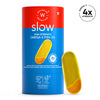Omega-3 fatty acids aren’t just a wellness trend—they’re fundamental to brain health across every life stage. From supporting brain development in children to enhancing cognitive resilience in older adults, omega-3s—especially EPA and DHA—are essential for keeping your mind sharp, balanced, and focused. In this blog, we explore how omega-3s impact brain performance, emotional well-being, and what to look for when choosing a supplement that truly delivers.
What Are Omega-3 Fatty Acids?
Omega-3s are essential fats, which means your body can't make them on its own. You need to get them through food or supplements. There are three primary types:
-
ALA (alpha-linolenic acid): Found in plant oils like flaxseed and chia seeds.
-
EPA (eicosapentaenoic acid): Found in marine sources like fatty fish.
-
DHA (docosahexaenoic acid): Also found in fish, and most critical for brain health.
While ALA is beneficial, it’s EPA and DHA that directly support cognitive and emotional functions, making them the real MVPs when it comes to brain health.
Why Your Brain Loves Omega 3s
Omega-3 fatty acids are like premium fuel for your brain. They help with structure, signaling, mood, and protection. Here’s how:
Brain Development and Function
Did you know your brain is nearly 60% fat? And a good portion of that is DHA. This omega-3 plays a key role in forming brain cell membranes and supporting synaptic function.
In infants and children, DHA is vital for brain development, memory, and visual acuity. For adults, it continues to support neural integrity and plasticity, helping your brain stay sharp. A study found that DHA is crucial in brain and retina development and that deficiency during critical growth periods can result in lasting neurological consequences (NIH).
Cognitive Performance
As we age, memory and mental agility naturally decline, but omega-3 fatty acids can slow that process down. DHA supports neurotransmitter activity, while EPA has anti-inflammatory properties that may prevent brain aging.
Regular intake of omega-3 supplements may improve attention span, memory recall, and even processing speed, especially in those who are deficient or at risk of cognitive decline. A study published found that EPA and DHA supplementation enhanced executive function and working memory in healthy adults (NIH).
Mood, Mental Clarity, and Emotional Well-being
Struggling with brain fog or emotional ups and downs? Omega-3s might help. EPA, in particular, is known to support neurotransmitter regulation and reduce inflammation linked to mood disorders.
Several studies suggest that higher omega-3 intake is linked to a lower risk of depression and anxiety. While it’s not a replacement for mental health care, it can be an important tool in your wellness kit. Another study found that omega-3 supplementation, especially with higher EPA content, was effective in reducing symptoms of major depressive disorder (NIH).
What Does the Research Say?
The benefits of omega-3 and brain health are more than anecdotal, they’re backed by science.
A study concluded that omega-3 fatty acids offer significant neuroprotective effects, particularly in preventing cognitive decline associated with aging and neurodegenerative conditions like Alzheimer’s disease (NIH).
A review highlighted that the ingestion of omega-3 fatty acids increases learning, memory, cognitive wellbeing, and blood flow in the brain (NIH). Another study found that among healthy, cognitively older adults, increased levels of omega-3 fatty acids are associated with better memory, processing speed, and structural brain measures (NIH).
Choosing the Right Omega-3 Supplement
If your diet doesn’t include at least two servings of fatty fish per week, you might need a high-quality omega-3 supplement. But not all are created equal. Here’s what to look for:
-
High DHA + EPA content: Aim for a combined 1000 mg or more per serving.
-
Triglyceride form: This form is more bioavailable than ethyl esters.
-
Sustainably sourced: Go for wild-caught, MSC-certified options.
-
Third-party tested: Ensure purity, potency, and freedom from heavy metals.
A great example? A clinically studied omega-3 made from wild-caught fish, blended with antioxidants like astaxanthin for added protection, ideally in a softgel that’s easy to digest and leaves no fishy aftertaste.
Conclusion
When it comes to the brain and omega-3, the science is clear: these fatty acids are a foundational element of cognitive vitality, mental balance, and long-term brain health. From supporting childhood development to preventing age-related decline, omega-3s are a non-negotiable part of a well-rounded wellness routine.
FAQs
1. How much Omega-3 do you really need for brain health?
For brain health, aim for at least 1000 mg of combined EPA and DHA daily, especially if you're not getting enough from fatty fish like salmon or mackerel.
2. Is it safe to take omega-3 supplements daily?
Yes, daily omega-3 supplementation is generally safe and well tolerated, especially when the supplement is high quality, sustainably sourced, and third-party tested for purity.
3. How long does it take for omega-3 to work for brain health?
You may start noticing cognitive and mood benefits within a few weeks, but more significant results like improved memory or focus can take up to 3 months of consistent use.
4. What food is highest in omega-3?
Fatty fish like salmon, mackerel, and sardines are the richest sources of EPA and DHA, while plant-based sources like flaxseeds and chia seeds provide ALA.
































